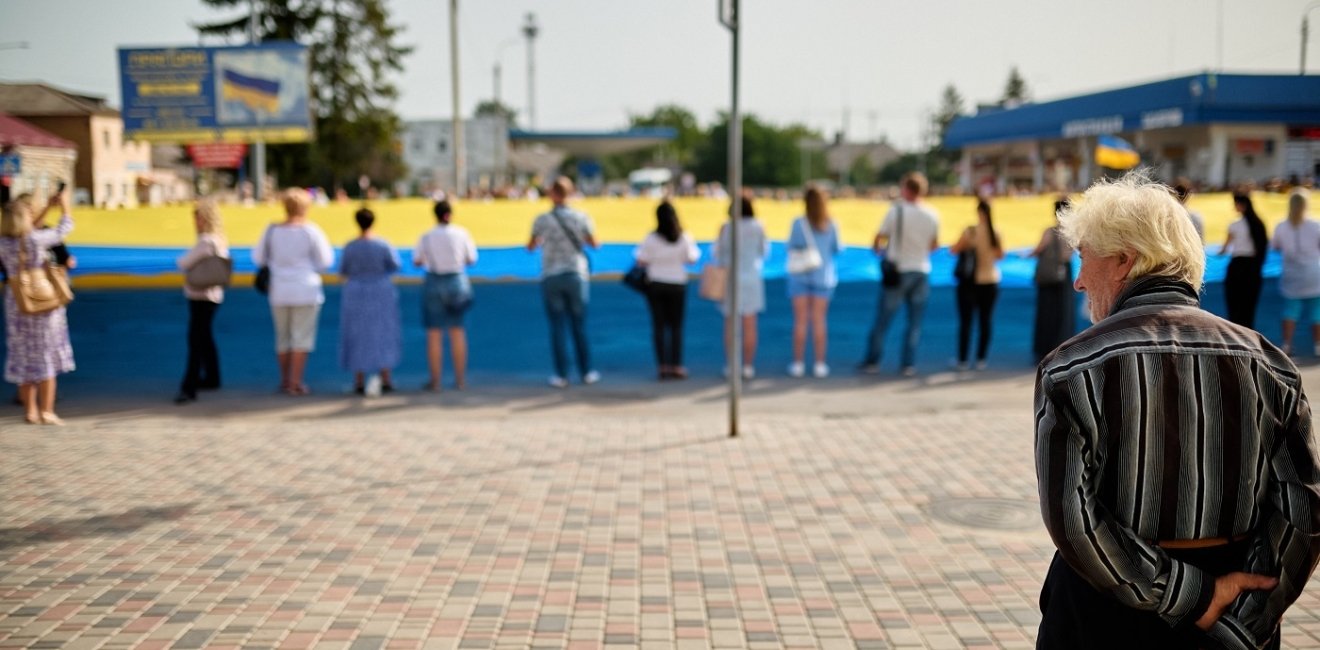
A blog of the Kennan Institute
This is the second in a series of three articles examining generational divides in wartime Ukraine. Read parts one and three.
Russia’s recent invasion of Ukraine has had a dramatic impact on how Ukrainian people view Russia, Russians, and the Russian language. But do these changes occur across all generations of Ukrainians? Our study of Ukrainians in three frontline cities reveals complex patterns of differentiation from Russia.
Demonstratively asserting fundamental differences between Ukraine and Russia is part of Ukraine’s war resistance. A May 2022 telephone survey by the National Democratic Institute revealed a surge in the number of people speaking more Ukrainian in everyday life. According to an April 2022 computer-assisted telephone interview poll funded by the International Republican Institute, 88 percent of Ukrainians said that their opinion of Russia had worsened a lot after the invasion. Only 2 percent of Ukrainians were interested in joining the Customs Union with Russia. But are Ukrainians across generations, especially Russian speaking Ukrainians in the southeast, really so unified in their repudiation of Russia, Russians, and Russian culture?
Surveying Frontline Ukrainians
We organized a face-to-face survey of more than 1,800 Ukrainians, half of whom were local residents and half internally displaced persons (IDPs), in three towns close to the regions where active fighting is taking place: Dnipro, Zaporizhzhia, and Poltava. The Kyiv International Institute of Sociology administered the survey in July. Local residents were surveyed using a random selection of electoral precincts, and IDPs by location sampling.
Generational Divides and Expectations
We decided to divide up the population generationally based on the history of Ukrainian independence: first, the Soviet generation (age 60 years and older), who were 30 years old when the Soviet Union collapsed; second, the transition generation (45–59 years old), who were educated and launched in the Soviet Union; third, the post-Soviet generation (30–44 years old), who were educated in independent Ukraine and have little memory of the USSR; and fourth, the young generation (18–29 years old), who have no memory or experience of the USSR. We predicted that younger generations would express stronger differences with Russia and that the dimensions of political, cultural, and moral differences from Russians would fluctuate among generations.
Social Boundaries
We asked our sample of respondents whether they saw Russia and Ukraine as completely different nations. The older generations tend to see fewer differences from Russia. While 78 percent of respondents under 45 years old see Russia and Ukraine as completely different nations, only 64 percent of those age 45 and older agreed with this statement. Similarly, whereas 57 percent of respondents under 45 years believe there are strong differences between Ukrainian and Russian citizens, only 44 percent of those age 45 years and older hold a similar view. When asked about the similarity of Russian and Ukrainian culture, 40 percent of respondents under 30 years strongly disagreed that there is any similarity. This percentage declined through each age group, from 33 percent for respondents ages 30–44 years old respondents to 29 percent for respondents ages 45–59 years old and 20 percent for those age 60 years and older.
The social norms of differentiation with Russia are also stronger among the younger generation. While 57 percent of respondents under 30 years believe it is critical to stress the differences between Ukrainian citizens and Russian citizens, only 34 percent of respondents age 60 years and older agree with this normative prescription. Similarly, three quarters of young people but only slightly more than half of people age 60 and older believe that Russia and Ukraine should be seen as completely different nations. Disagreement that Russian and Ukrainian cultures should be seen as similar declined from 67 percent for respondents under 30 years old to 57 percent for respondents ages 30-44 years, 52 percent for respondents ages 45–59 years, and 46 percent of those age 60 years and older.
Moral Boundary Assertions
Perceptions about moral boundaries between Russians and Ukrainians also show a strong generational divides. While around 50 percent of respondents under age 60 strongly disagreed that Ukrainians and Russians have similar morals, only a third of respondents age 60 and older disagreed with this statement. A similar divide was evident in perceptions of whether Russians and Ukrainians are different spiritually. No age difference was found for social norms of moral differentiation: respondents of all generations see the importance of stressing the greater moral strength of Ukrainian people over Russian people.
Our expectation that younger generations would have stronger differentiation attitudes toward Russia and Russian culture was largely affirmed. Older generations saw slightly less cultural differences with Russia and the Russian people and were less accepting of social norms that insist on cultural differentiation. Age differences were more prominent for the moral boundary with Russia and the Russian people, with respondents age 60 and older seeing fewer differences in morals and spirituality than younger generations. However, respondents of all ages agreed that seeing moral differences with Russia is now a prevalent social norm in Ukrainian society.
This publication is based on research supported by the US National Science Foundation (award number 2226741).
The opinions expressed in this article are those solely of the author and do not reflect the views of the Kennan Institute.
Authors

Professor and Director, Program on History, Memory, and Conflict, Carter School for Peace and Conflict Resolution, George Mason University


Kennan Institute
After more than 50 years as a vital part of the Wilson Center legacy, the Kennan Institute has become an independent think tank. You can find the current website for the Kennan Institute at kennaninstitute.org. Please look for future announcements about partnership activities between the Wilson Center and the Kennan Institute at Wilson Center Press Room. The Wilson Center is proud of its historic connection to the Kennan Institute and looks forward to supporting its activities as an independent center of knowledge. The Kennan Institute is committed to improving American understanding of Russia, Ukraine, Central Asia, the South Caucasus, and the surrounding region through research and exchange. Read more

Explore More in Focus Ukraine
Browse Focus Ukraine
Talking to the Dead to Heal the Living

Ukrainian Issue in Polish Elections


